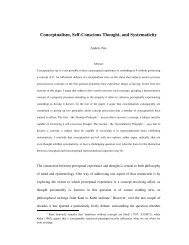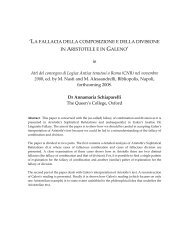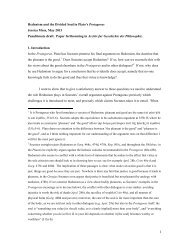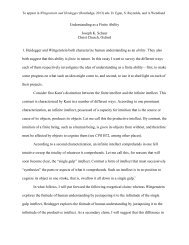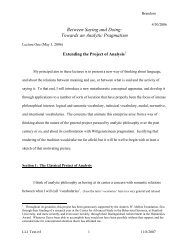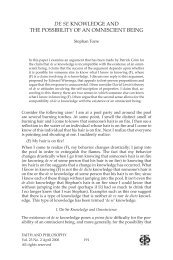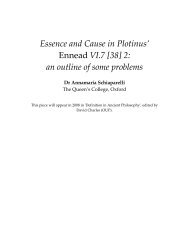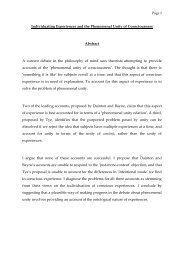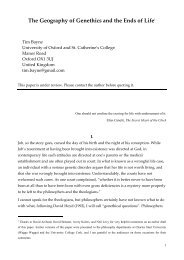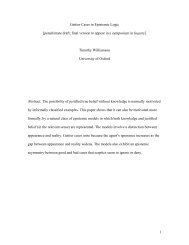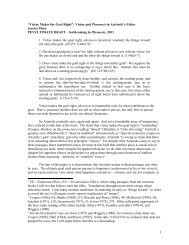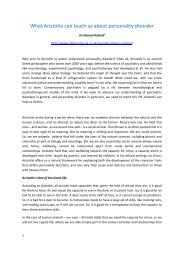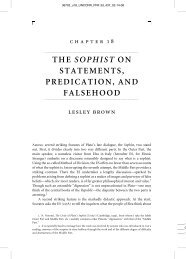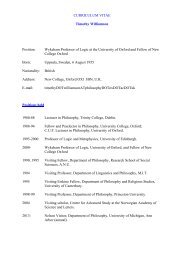Say who everyone is as you go along - Faculty of Philosophy ...
Say who everyone is as you go along - Faculty of Philosophy ...
Say who everyone is as you go along - Faculty of Philosophy ...
Create successful ePaper yourself
Turn your PDF publications into a flip-book with our unique Google optimized e-Paper software.
38<br />
'Why could the world which <strong>is</strong> <strong>of</strong> any concern to us - not be a fiction? (BGE para 34<br />
p.66)<br />
Rather <strong>as</strong> someone reading a novel or watching a play <strong>is</strong> immersed in a world that <strong>is</strong><br />
not real, so we in our daily lives are preoccupied with a world that concerns us that <strong>is</strong><br />
not real. Nietzsche <strong>is</strong> suggesting that we live in an imaginary world.<br />
Now, there <strong>is</strong> no re<strong>as</strong>on to take th<strong>is</strong> to mean that the ordinary physical objects<br />
and the other people <strong>who</strong> surround us ex<strong>is</strong>t only in our imaginations. Nietzsche does<br />
not hold that and, so far <strong>as</strong> I can tell, no philosopher h<strong>as</strong> held that. However, what we<br />
take the world <strong>of</strong> objects and people to be <strong>is</strong> something that <strong>is</strong> only imaginary. We<br />
project onto the world our own hopes and fears, our desires and limitations. We try to<br />
use the world <strong>as</strong> a means to our own ends and th<strong>is</strong> largely takes the form <strong>of</strong><br />
perceiving it or conceiving it <strong>as</strong> a means to our ends. Nietzsche thinks we live out our<br />
lives in th<strong>is</strong> imaginary or fictitious way. Much <strong>of</strong> our mental time <strong>is</strong> taken up with<br />
hoping, fearing, phant<strong>as</strong><strong>is</strong>ing, worrying, in ways that correspond to very little outside<br />
our minds.<br />
Nietzsche <strong>is</strong> aware <strong>of</strong> a possible limitation <strong>of</strong> the analogy with works <strong>of</strong> fiction.<br />
A work <strong>of</strong> fiction h<strong>as</strong> an author, but one <strong>is</strong> not in any clear or direct sense the author<br />
<strong>of</strong> the imaginary world in which one lives out one's life. Nietzsche says:<br />
'And he <strong>who</strong> then objects: "but to the fiction there belongs an author?" - could he not<br />
be met with the round retort: why?' (BGE para 34 p. 66)<br />
From the fact that a work <strong>of</strong> fiction h<strong>as</strong> an author it does not follow that that author <strong>is</strong><br />
an original creator. An originator causes to ex<strong>is</strong>t something original, something<br />
without precedent, perhaps even without partial precedent. An originator creates<br />
something ex nihilo. An originator creates perhaps with freedom and undetermined<br />
spontaneity. An originator <strong>is</strong> a point <strong>of</strong> origin from which something emanates. Now,<br />
even if we are the authors <strong>of</strong> our own imaginary life-worlds, and even if a writer <strong>is</strong><br />
the author <strong>of</strong> a work <strong>of</strong> fiction, it <strong>is</strong> doubtful that either <strong>is</strong> an originator in th<strong>is</strong> very<br />
strong sense. The causal chain that runs from the author to h<strong>is</strong> imaginary product h<strong>as</strong><br />
an origin that predates h<strong>is</strong> work (if it h<strong>as</strong> any kind <strong>of</strong> origin). A creator <strong>is</strong> caused to<br />
create. A creator <strong>is</strong> caused to create what he creates.<br />
Nietzsche <strong>is</strong> not an ideal<strong>is</strong>t because he denies that only the mental <strong>is</strong> real. He<br />
does not think our imaginary world <strong>is</strong> the only world, or the real world. It <strong>is</strong><br />
erroneous because it contr<strong>as</strong>ts with the real, true, or practical world. It <strong>is</strong> a fiction<br />
because it <strong>is</strong> not a fact. Nevertheless, only our imaginary world <strong>is</strong> given to us <strong>as</strong> real:<br />
'Granted that nothing <strong>is</strong> "given" <strong>as</strong> real except our world <strong>of</strong> desires and p<strong>as</strong>sions<br />
[...]'(BGE para 36 p.66)<br />
Nietzsche's claim <strong>is</strong> ambiguous between the thes<strong>is</strong> that no one <strong>is</strong> ever directly<br />
acquainted with anything except the contents <strong>of</strong> their own minds and, on the other



